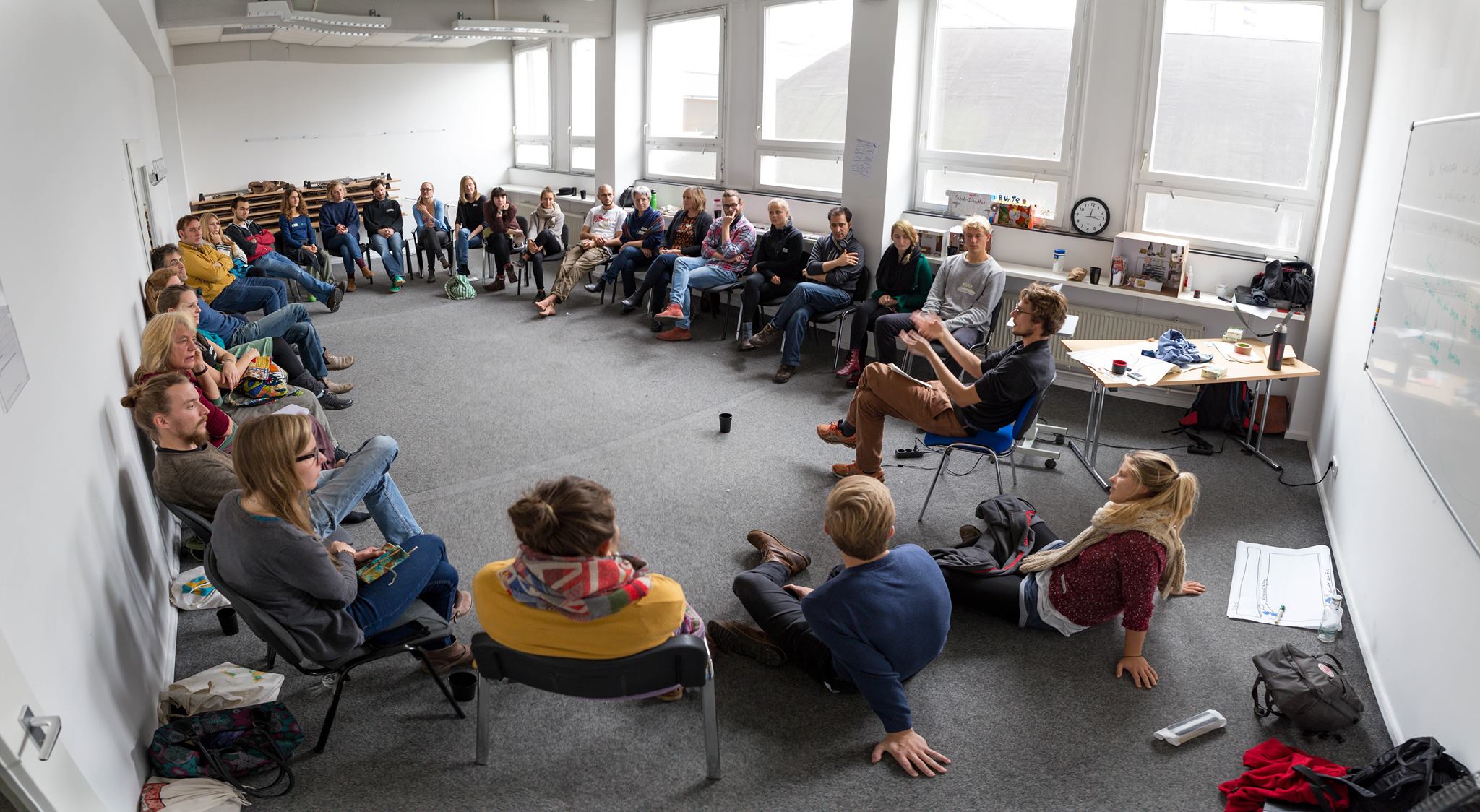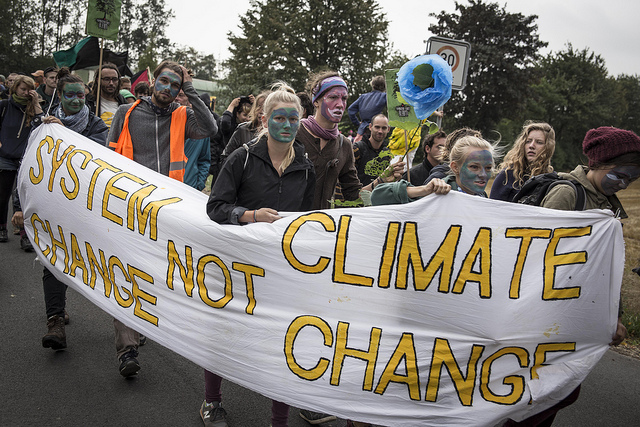One of the most controversially discussed key tracks during the 5th International Degrowth Conference 2016 in Budapest was “Degrowth and other social movements”. Can degrowth be considered a movement? Does degrowth embrace all kinds of movements struggling for a sustainable future? On one hand, the notion of “degrowth movement(s)” was rigorously criticized for fragmenting the political struggle. It was also critiqued as umbrella concept for creating incongruous hierarchical relations between degrowth and other movements with a much longer history as feminism, Buen Vivir, Ubuntu, etc. On the other hand, an intensive dialogue opened up about existing and future alliances between degrowth and other social movements. Before focusing on some promising synergies between degrowth and the Global Ecovillage Network (GEN), some initial considerations need to be introduced.
During the Friday morning plenary, environmentalist and sociologist Ashish Kothari emphasized in his outstanding speech about “Radical alternatives to unsustainability and inequality from a global perspective” that the movements in the global South emerge from basic survival and therefore express themselves differently than in the global North for instance degrowth. He referred to initiatives of the South as alternatives fighting against the new and old deprivations of basic needs and presented a lot of examples of initiatives trying to raise well-being in India and the world.
Likewise, considering and understanding the emancipatory struggles in other parts of the world was the starting point for my analysis of “Synergies between the degrowth movement and the Global Ecovillage Network” presented at the conference. This analysis is a continuation of my previous research based on an interactive database of semi-structured video interviews with biologists, lawyers, economists, scientists and indigenous experts on the case of the Yasuní National Park in Ecuador realised during 2014. In a book contribution (Veciana, 2016b) based on this data, I examined, among other things, modes of linking disconnected debates, for instance the debate of European degrowth as the complementary side of the debate about Latin American Post-Extractivism (Monge, Gudynas, Acosta).
Hence, what does degrowth mean in different contexts of globalisation? Degrowth in the North predominantly debates about dematerialisation, de-commodification and decentralization. This way it aims to diminish North-South inequality and lower the demand on natural resources for a “sustainable development” in the South beyond the Northern growth path. Often, however, alternatives in the South do not identify with the term degrowth. Independent from the „(de)growth and development imaginary“ they follow their own trajectories to what they conceive as good life, such as Buen Vivir / Vivir Bien, while claiming global environmental justice, indigenous rights and rights for nature. Whereas the North points to redefine the meaning of well-being by overcoming growth patterns and to foster deeper democracy through autonomy and self-determination, initiatives in the South generally build on traditional social and environmental ties based on giving, receiving, sharing and reciprocity.
In order to outline the conditions of ecovillages in the global North and global South, the analysis of the challenges or lessons learned by degrowth and post-extractivism debates offers particularly valuable and applicable insights. A lesson that degrowth still has to learn is to increase the Northern awareness of it’s own destructive basis due to dominant production and life styles and their impact on other world regions. Another trap may be to underestimate patterns of thinking, materialized structures and conflicting interests when implementing degrowths’ goals of dematerialisation, de-commodification and decentralization. Finally, the necessity of changing international political, socio-economic and cultural conditions to create alternatives to (neo)extractivism is a big challenge. In relation to post-extractivisms’ radical criticism of the (mercanitilistic) overuse and destruction of nature, such learning process may also consist in making the power structures, destructive mechanisms of capitalism and the costs of the existing development model more visible. This would allow Southern alternatives to intervene more radically and on a broader scale. An added challenge may be to create the appropriate conditions for the flourishing of diverse approaches to well-being and good life as a result of different living experiences.
Within the former described global conditions, ecovillages have evolved differently. In the North they usually are intentional communities whose residents want to live a more ecological lifestyle and experience more of a sense of community. They are mostly smaller than traditional villages and organized by a participative self-governing body. Gilman describes them as communities of practice or „centers of research, demonstration, and training“ i.a. generating strategies for communal scaling down of ecological footprints.
Ecovillages in the South are mainly traditional indigenous villages whose residents want to stop environmental destruction, generate sustainable local economies, and preserve their traditional culture. They most often need to ‘scale up’ in order to meet their basic needs and have a lively functioning social system of solidarity, while footprints are low.
In order to bridge ecovillages all over the world and bundle innovative impulses for a broader society, the Global Ecovillage Network (GEN) was established in 1996. Over the years regional organizations evolved in all continents. In an annual international conference further networking is invigorated, local knowledge and sustainable traditional knowledge is shared and worldwide cooperation projects are fostered. Besides, daughter organization GAIA Education created an ecovillage design education program for actively engaging in more global social and ecological justice. All activities are embedded in an integrative approach to sustainability that encompasses the social, cultural, ecological and economic dimensions of human existence.
Especially in the social dimension ecovillages are exceptionally experienced and creative and have generated a host of community building practices for a sustainable degrowth society. For example, ecovillages in the North have shaped multiple methods of self-empowerment and community building such as Forum (ZEGG, Germany), We-Process (Schloss Tempelhof, Germany), Peace and Healing Work (Tamera, Portugal) or Dreamwork (Los Portales, Spain).
Ecovillages in the South have evolved their ancestral practices such as Minga (work exchange), spiritual rituals (eg, to induce rain, to ensure fertility in crops, animals or women, to provide protection) and continuous community practices (e.g. to solidify alliances, to initiate groups/individuals of an certain age, etc.). This way, eco-villages have developed manifold qualities for a sustainable degrowth society by means of self-empowerment and community-building methods, social conviviality tools for alternative world-views and mediating structures for North-South reconciliation work.
Ecovillages and even urban villages have also examined (Homs) as a vision for a degrowth society, specifically from the perspective of relocalization in terms of local production and consumption of goods and services, decentralized decision making and self-sufficient economy. As decentralized small-scale human settlements tailored to their bioregions, ecovillages are more able to utilize local resources and realize self-sufficiency. Further arguments are the localization of economic, social and cultural activities in the local environment, vitalizing community life and promoting non-material social relations. However, the limits of applicability of the ecovillage relocalization model to the main society have also been discussed (Xue) in terms of being too time- and resource-demanding to be adapted in existing cities. Additionally the model is criticized for potentially producing more mobility if the localization of activities is not possible because of the distant location of employment, public facilities (e.g. hospitals, universities) or events. But also the argument of an increasing footprint of built-up land has been raised against this model, threatening for instance biodiversity. Therefore, the opportunities for degrowth qualities to contribute to the global ecovillage network in this context are manifold. This could entail, for example, making a prospective overall evaluation of upscaling the ecovillage relocalization model or by analysing the impact of building spatial units with close linkages to the larger sustainable urban and global structures.
Besides the synergies between degrowth and GEN in the fields of relocalization and social practices, building a global commons knowledge network maybe considered another field for promising collaboration. Such network could imply to share research, education and learning strategies focusing on a larger scale and to combine different patterns of knowledge such as scientific, practitioners and activist knowledge. In this context, ecovillages create ideal resilient environments for research on how to implement degrowth theories. To put this exploratory endeavour into practice, already existing knowledge structures could be used. One ally could be the academic association Research & Degrowth, (R&D) based in France and Spain which is dedicated to research, training, awareness raising and events organization around . Another associate could be the GEN International Research Group that is committed to ecovillage and community-based research, e.g. by developing guidelines for action research in ecovillages, offering bibliography and networking for research applications. As a third partner to join the collaboration could be the people2people research institute (p2pr) based at Sieben Linden ecovillage in Germany that envisions an integrative, close to everyday life, community-based, value-led and responsible research practice and focuses its research on transformation research for sustainable resilient societies, sustainable regional and urban linkages, community research, and participatory methods.
Altogether, by building new fields of collaboration, degrowth and the Global Ecovillage Network may find common ways to leave the growth system beyond the conceptual discussions regardless of whether degrowth is a movement or an umbrella for different movements. The presence of GEN in the last two Degrowth Conferences in Leipzig and in Budapest has shown the high potential of mutual learning of this alliance for a common sustainable society. _______________
Literature
Die UTOPIKON ist jetzt vorbei und der Beweis ist erbracht: es ist absolut möglich, eine "echte" Konferenz mit Keynotes, Workshops, Verpflegung und allem, was dazugehört, geldfrei, vegan, ökologisch und solidarisch zu organisieren. Gleichzeitig hat die Konferenz auch noch unglaublich viel Spaß gemacht: selber etwas zu erleben, von dem es geheißen hatte, das das ja eigentlich gar nicht geht, ha...

Von Kai Kuhnhenn und Eva Mahnke Teile von Politik und Wirtschaft loben Deutschland gern als „Klimaschutzvorreiter“, zuletzt etwa die vier CDU/CSU-Politiker Michael Fuchs, Georg Nüßlein, Joachim Pfeiffer und Thomas Bareiß in einem Brief an ihre Fraktion. „Deutschland gehört global zu den Vorreitern bei der Erneuerbaren- und Klimapolitik“, heißt es darin. Wer anderes behaupte, versuche die weitr...
Das Statistische Bundesamt schreibt trocken: „Vor dem Hintergrund der steigenden Anforderungen an die Vergleichbarkeit des BIP hat die Europäische Kommission die Mitgliedsstaaten nun aufgefordert, auch verbotene Produktionsaktivitäten spätestens ab September 2014 in das BIP einzubeziehen. Konkret geht es dabei um Drogen, Schmuggel und Prostitution, die EU-weit als signifikant gelten.“ (Statistisches Bundesamt). Wer auch wissen will, [...]